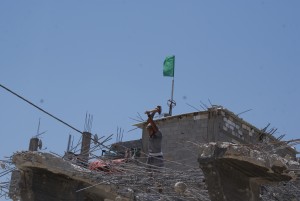Voices in the climate wilderness
Even with a Nobel peace prize, there's a limit to what Al Gore can do, and so a group of determined eco-worriers are making plans to tackle the climate crisis from the grassroots.
A few days after Al Gore was awarded his Nobel peace prize, we entered the time warp of the Greenwich, an art nouveau Brussels café that has remained unchanged for the better part of a century, weathering passing fads with casual indifference. Amid the swirling smoke, music-less air, chess players and punters young and old, we met up with a group of ecological dissidents on a mission to heal the planet from the grassroots up.
At the centre of the group is Dimitri Thienpont, a self-described eco-dissident who has lost confidence in society's ability to avert the coming environmental storm. He is working to bring together dozens of radical groups in the Benelux countries – and later the rest of Europe – to plot an alternative course.
“We can't turn the ship as it's already heading towards the rocks. Instead, we want to construct viable alternatives,” he said.
Al Gore may be on a one-man mission to open the eyes of the unconverted to an inconvenient truth in his “100-minute presidential election campaign advertisement”, as Mark Simpson sceptically described it. But many in the environmental movement see the situation of the planet as more than just inconvenient; they regard it as near catastrophic.
To his credit, Al Gore has done a lot to put climate change on the political agenda, particularly in resource-hungry America. The trouble is that being aware of a problem is not the same as taking action to tackle it. The polar icecaps are thawing faster than public consciousness in America and, in Europe, we have the good intentions but are falling shy of our Kyoto commitments. And it is the glacial pace of political change that is fuelling this discontent among young eco-worriers.
Moreover, climate change may be a hot issue, but it's not the only show in town. Carbon footprints have become the Big Foot of mainstream environmentalism. But by focusing too much on the Yeti of greenhouse gas emissions, I feel we're losing sight of the bigger picture – our environmental woes do not end at smokestacks. We're gobbling up all the Earth's resources at a breakneck pace and biodiversity is rapidly becoming a thing of the past. There are no longer “plenty more fish in the sea” and we can see the wood (in our homes and offices) but not the trees.
So, what's the answer? Dimitri thinks the way forward is to round up radical ecological dissidents from the environmental hinterland and create an umbrella movement to amplify their voice in the political wilderness. This would enable them to better challenge the received wisdom of economic growth as the panacea to all our ills, and demonstrate that people can be happy and lead fulsome lives with fewer material trappings.
“We first want to build bridges between disparate dissident groups and then address the mainstream,” he explains.
The first step in this bridge-building exercise is for the “system shifters” to get away from it all for a camp at Mesnil-Église, which used to be a hippy village in the Belgian Ardennes, where they can share knowledge, cross-fertilise and chart a course forward for the nascent movement. The movement has received the provisional name “Grounded” to express the idea of being sensible and down to earth.
Among the dozens of weird and wonderful groups which have already expressed an interest are the Radical Fairies, eco-feminists, the Clandestine Insurgent Rebel Clown Army (CIRCA), Dissent Belgium, Cage and Groen Front (the Green Front).
Although I hold certain radical views, I have never really been an activist, since I am too sceptical (and perhaps apathetic or lazy) to give myself entirely to a cause. Attending the inception of a new radical group like this was a novel experience for me.
I have been interested in the environment since I was a teenager. But belonging to a part of the world, the Middle East, with apparently more pressing political issues, I have focused more, in my writing and my conscience, on other causes. Although I admire the radical lifestyle changes the ecologically minded have made, I don't think I can personally go as far. But, essentially, each of us needs to do what's in their capacity to ease the strain on this overloaded planet.
For me, it will be interesting to see, in the long run, the comparative effect of radical groups like this and more mainstream efforts. Which will ultimately have a greater impact: the campaigns to get us to tweak our lifestyles – such as by turning down the heating and cycling more – or attempts to construct a counterculture and later mainstream it?
Many of the radical ideas of environmentalists in the 1960s and 1970s have now been accepted as received wisdom. So, there is the chance that this new generation's notions will one day, too, be embraced by society. But I can't help thinking that humanity is stuck on the fast lane and is unlikely to change its ways fundamentally until it is forced to do so.
_________
This article first appeared in The Guardian on 19 October 2007.


